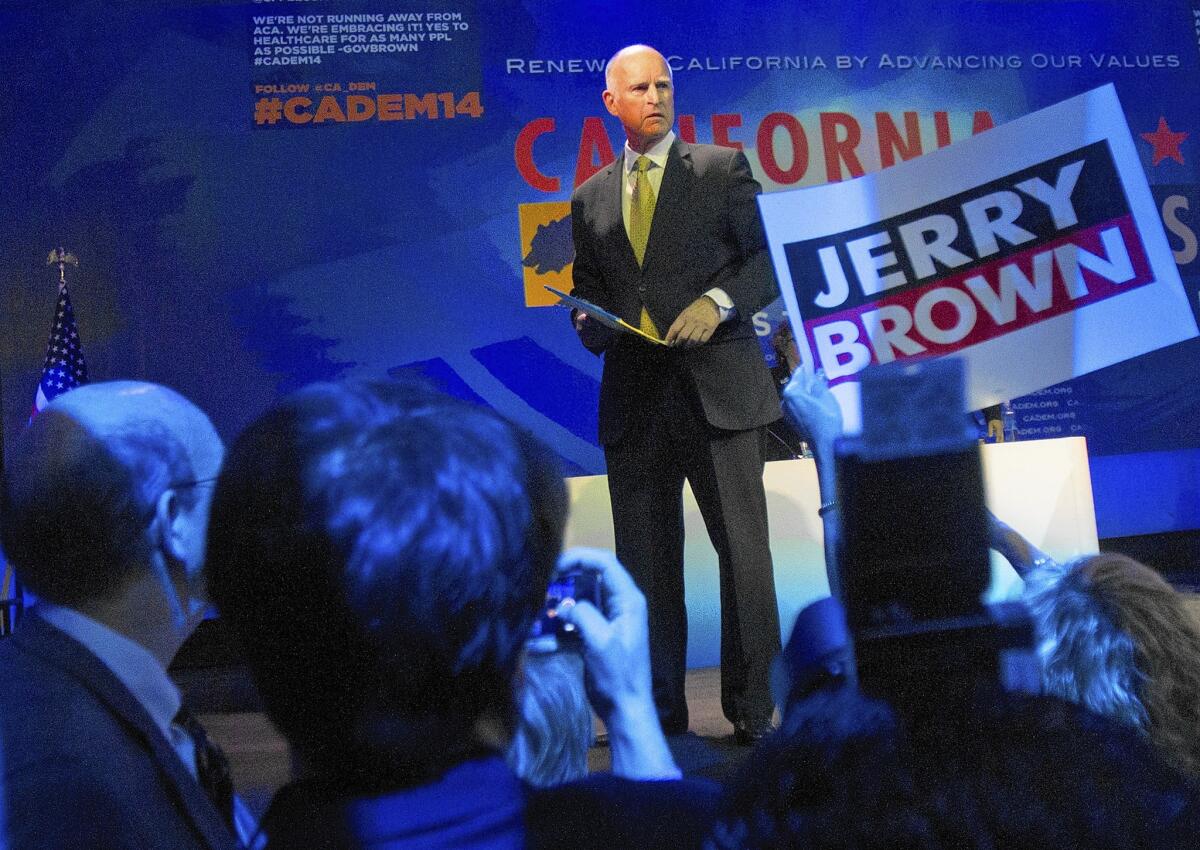Revised Brown plan for rainy-day fund gets bipartisan support

Gov. Jerry Brown’s reelection bid received a boost Thursday when top Democrats and Republicans in the Legislature united behind a compromise version of his plan to save money in a rainy-day fund and pay off state debt.
The bipartisan accord advances Brown’s efforts to stabilize California’s rocky finances and vindicates his high-profile decision to call a special legislative session on the issue, focusing attention on his proposal in the run-up to the June primary.
Negotiations with lawmakers led to several changes in Brown’s original plan, including ensuring more dependable deposits into the rainy-day fund, placing stricter rules on when cash can be withdrawn and requiring that some money be used to reduce debt.
The Legislature is expected to vote on the measure next week. If passed, it will be placed on the November ballot.
“There’s nothing complicated about the idea of saving money and exercising fiscal restraint, but it’s not always easy to do,” Brown said in a statement Thursday. “Democrats and Republicans have come together to create a rainy-day fund that ensures we’re not only saving for the next downturn but also paying off our debt.”
The deal was a test of the changed political dynamic in the Capitol, where criminal investigations have eliminated Democrats’ supermajority in the Senate. Because the proposal is a constitutional amendment and requires a two-thirds vote, Brown needed to win over some Republicans.
The governor also faced concerns from Senate leader Darrell Steinberg (D-Sacramento), who wanted to ensure that enough money would remain to restore more social services cut during years of budget crises.
But in this election year, a measure with potentially broad voter appeal was likely to pass from the start. Legislative leaders from both parties already favored the broad outlines of the governor’s plan.
Even one of Brown’s Republican opponents in the June 3 primary, former U.S. Treasury official Neel Kashkari, said he supported it.
“The way things look now, there’s no threat to Brown,” said Larry Gerston, a political science professor at San Jose State.
The final agreement provided a rare opportunity for unity among legislative leaders from both sides of the aisle. Assembly Speaker John A. Pérez (D-Los Angeles), who began pushing for a new reserve fund savings plan last year, called it “a strong example of what is possible when we all work together.”
In the negotiations, Republicans abandoned a separate proposal for a rainy-day fund, one hotly opposed by Democrats and already scheduled for the November ballot.
Brown agreed to tighter rules on deposits into — and withdrawals from — the fund. For example, his original plan would have reserved only spikes in revenue from capital gains taxes. The revised plan would require an additional 1.5% of general-fund revenue to be set aside.
Half of the money would go into the rainy-day fund; the other half would be used to pay debt and cover long-term costs such as public pensions.
“Instead of stockpiling money while ignoring looming debt, this smarter approach locks the state into saving and attacks our wall of debt and unfunded liabilities,” Steinberg said in a statement.
Earlier this week, legislative analysts detailed $200 billion in long-term costs, including teacher pensions and healthcare for retired state workers, that still need to be addressed by state leaders.
Under the new plan, money could be withdrawn from the rainy-day fund only when general-fund revenues fall below the highest level of spending in the previous three years, meaning the state was struggling to meet its obligations.
Brown’s original proposal would have allowed withdrawals with an emergency declaration from the governor and a majority vote in the Legislature, a standard that Republicans said was too lax.
“Republicans have long fought for this type of protection for Californians,” said a statement from Senate GOP leader Bob Huff (R-Diamond Bar). “Good things happen when we can work together to benefit all Californians — I am confident the people will agree when they get to vote for it on the November ballot.”
Thursday’s agreement came nearly a week before Brown is expected to release his updated budget proposal for the next fiscal year. It cleared a major issue from the negotiating table as the governor and lawmakers prepare their annual debate over state spending.
Revenue from taxes on personal income and corporations has exceeded the governor’s January estimates by $2 billion, according to the nonpartisan Legislative Analyst’s Office.
Much of the money will be directed to schools and community colleges and to higher payments into its largest pension fund.
More to Read
Start your day right
Sign up for Essential California for news, features and recommendations from the L.A. Times and beyond in your inbox six days a week.
You may occasionally receive promotional content from the Los Angeles Times.







